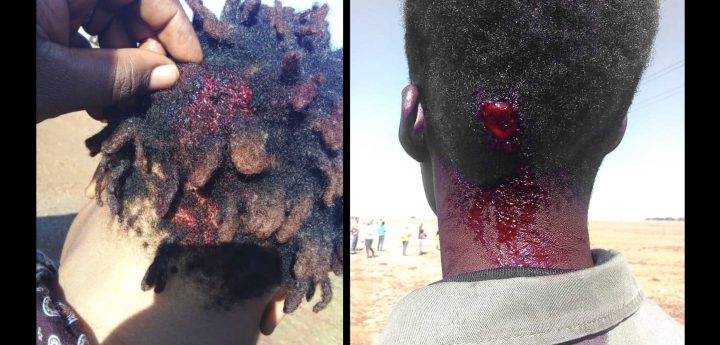Maverick Citizen
No restitution for the weary: Blaming the victim is an easy way out for failure to deliver the promised land

On Saturday, 18 September, police shot desperate land claimants in the head with rubber bullets when they demanded title deeds to their land, 23 years after their restitution claims were submitted in 1998.
Constance Mogale is a member of the Goedgevonden Community and a National Coordinator of the Alliance for Rural Democracy (ARD), a cross-section of civil society organisations advocating for recognition of customary land rights in South Africa.
The claimants had warned the Commission on Restitution of Land Rights that they intended to block a road to draw attention to the delays and lack of respect they had been shown. Soon, it will not only be the Goedgevonden community protesting: other restitution claimants will follow like a swarm of bees.
South Africa faces a serious challenge in ensuring that it delivers its constitutional mandate to communities to address the land question. Where service delivery has been poor, citizens have protested, particularly the hungry, dispossessed communities who are waiting for the restoration of their land. The frustration of the community of Goedgevonden has led to violent protests during which residents barricaded the road between Ventersdorp and Rustenburg. What was supposed to be a peaceful protest to demand title deeds turned into a bloody scenario, with police shooting rubber bullets at unarmed protesters.
“We fought and won [against] the apartheid government; we will fight for our land until it sinks in their thick skull! They can shoot us, but we will never surrender!” said one of the claimants who was shot during the protest on Saturday morning.
The community of Goedgevonden in North West have tried all avenues to fight for their land rights. In 1991 they were among the first forcibly removed communities to bravely re-occupy their land, despite a heavy police and army presence. This community has a rich history of resistance, especially in relation to land issues. The first claim to this land was lodged during apartheid with the assistance of the then Transvaal Rural Action Committee (TRAC) of the Black Sash.
When the ANC came into power in 1994, the new Constitution was adopted, and land restitution was constitutionally mandated. The Restitution of Land Rights Commission in the North West subsequently offered to pay community members what is referred to as “matlotla” in Setswana, meaning damages. The committee, which was liaising with the officials, is adamant that this money was NOT for land. The question that arose is how the commission arrived at the value of R58-million for three farms that were under claim. Who received the money? The community demands to know who the beneficiaries were and to know how they were identified. They also asked about the portions of their land occupied by destitute farmworkers in Welgevonden. They asked who was responsible for landless people in the country? Certainly not the poor communities who suffered the brunt of apartheid when agri-business profited from the forced removals and brought farmworkers onto their land.
Representatives of the Goedgevonden community had met with a senior official of the commission, Regional Director Lengane Bogatsu, and his colleagues in Rustenburg on 1 February 2018 to discuss their land claims. In that meeting, Bogatsu said the commission’s mistake was to assume that Goedgevonden was occupied by other people. The commission was advised to use section 2 of the Restitution of Land Rights Act to transfer the farm Goedgevonden to its current inhabitants.
The overlapping rights issue was also raised in that meeting and the department requested a list of anyone whose fields and grazing rights were initially left out, or undercounted, saying they could still apply for compensation. Some saw this as an opportunity to apply for more compensation, while others refused because they wanted the land title to be restored. Most Goedgevonden residents insisted on getting ownership of their farms, not focussing on disputes over money and divisions over “outsiders” who settled on the land.
The constitutional and legislative mandate is clear. Section 25(7) states: “A person or community dispossessed of property after 19 June 1913 as a result of past racially discriminatory laws or practices is entitled, to the extent provided by an Act of Parliament, either to restitution of that property or to equitable redress.” In addition, the following sections of the Constitution are relevant: Section 25, to ensure the protection of property rights including measures designed to foster conditions that enable citizens to gain access to land on an equitable basis.
Irrespective of the commission’s report on finalised claims, the Goedgevonden community is one of many communities left off the commission’s list of outstanding claims. It acts as though the claim has been resolved by the payment of monetary compensation of the land, knowing that the people reject this.
Until the land is transferred to the people, it should be counted among unfinalised “old order” claims. If our post-apartheid government is serious about radical transformation and wealth redistribution in this country, it should address the burning question of land rights and stop using violence to subdue constitutional rights, or surrender power. DM/MC




















 Become an Insider
Become an Insider
I am wondering what the actual land title deed ratios are in South Africa between those given to cadres and those given to bona fide claimants over the past 15 years.